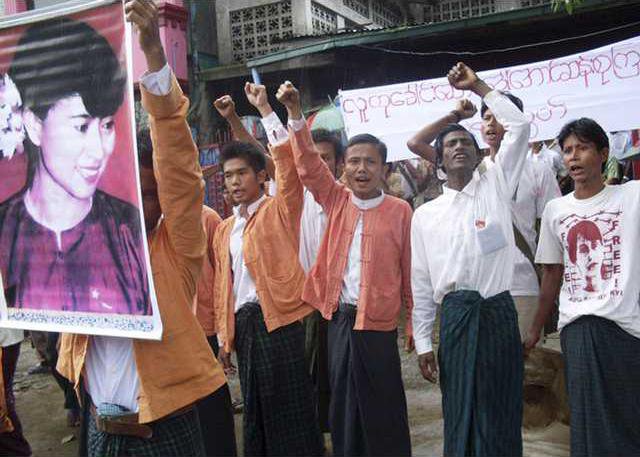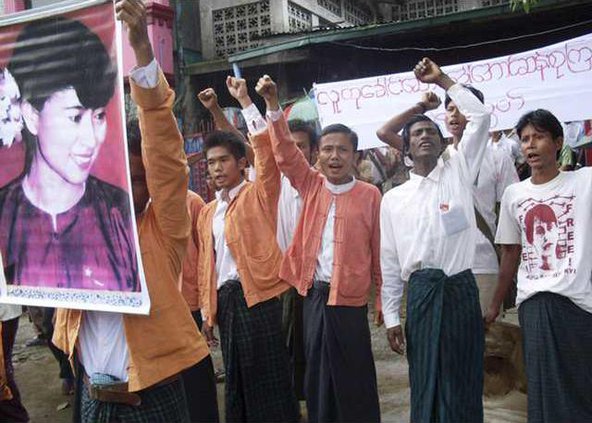YANGON, Myanmar — Myanmar’s military junta extended opposition leader Aung San Suu Kyi’s detention by one year Tuesday, ignoring worldwide appeals to free the Nobel laureate who has been detained for more than 12 of the past 18 years.
The move came as officials said that international aid workers had finally begun entering Myanmar’s cyclone-devastated delta area after being blocked for more than three weeks by the junta.
A government official, who spoke on condition of anonymity because he is not authorized to speak to the press, said that Suu Kyi’s detention was officially extended by one year on Tuesday afternoon.
Suu Kyi, who has been under house arrest continuously since May 2003, has long been the symbol of the regime’s brutality and the focus of a worldwide campaign that has lobbied for her release.
The extension was issued despite a Myanmar law that stipulates no one can be held longer than five years without being released or put on trial.
Earlier Tuesday, police hauled away about 20 opposition party members who were protesting Suu Kyi’s detention. Witnesses saw riot police shove members of the National League for Democracy into a truck as they were marching from the party’s headquarters to Suu Kyi’s home.
The decision comes at a delicate time for the junta.
It already is facing international condemnation for the way it failed the Cyclone Nargis relief effort, with more than half of the 2.4 million survivors of the storm still desperately needing food, clean water and shelter more than three weeks after the disaster.
Official government estimates put the death toll at about 78,000 with an additional 56,000 people missing.
But few expected Suu Kyi to be released, despite urging by both the United Nations and some members of the Association of Southeast Asian Nations.
‘‘The Burmese junta’s extension of Aung San Suu Kyi’s house arrest in clear violation of its own law comes as no surprise,’’ said Jared Genser, a U.S. lawyer hired by Suu Kyi’s family to push for her release. ‘‘Adherence to the rule of law is not their forte and the junta remains deeply concerned about her appeal to the Burmese people.’’
In Washington, President Bush said Tuesday he was ‘‘deeply troubled’’ by the extension of Suu Kyi’s house arrest but stressed that the U.S. would continue to provide aid to help cyclone victims.
‘‘The United States calls upon the regime to release all political prisoners in Burma and begin a genuine dialogue with Aung San Suu Kyi, the National League for Democracy, and other democratic and ethnic minority groups on a transition to democracy,’’ Bush said in a statement. ‘‘I look forward to the day when the people of Burma know true liberty and democracy.’’
British Foreign Secretary David Milliband also said he was ‘‘was saddened, if not surprised,’’ by the decision.
‘‘While our immediate focus is on relieving the suffering caused by the recent cyclone, restoration of democracy in Burma is still vital for that country’s long-term future,’’ he said in a prepared statement.
Myanmar has been ruled by the military since 1962. The current junta seized power in 1988 and refused to honor the results of 1990 general elections that were won by Suu Kyi’s party.
Myanmar’s leaders are leery of foreign aid workers and international agencies because they fear an influx of outsiders could undermine their control.
The junta is also hesitant to have its people see aid coming directly from countries such as the United States, which it has long treated as a hostile power seeking to invade or colonize.
Officials said Tuesday that international aid workers had finally begun entering the hard-hit Irrawaddy Delta. The apparent breakthrough in the flow of aid came after promises made by Myanmar’s ruling generals to the U.N. Secretary-General, who returned to New York on Sunday after a four-day visit.
‘‘International aid workers are starting to move to the delta,’’ said Richard Horsey, a spokesman in Bangkok for the U.N. humanitarian effort in Myanmar. Helicopters also began shuttling high-energy biscuits and ready-to-eat meals into the hardest hit area Tuesday, he said.
The French aid agency Doctors Without Borders said its teams had entered remote villages around the delta town of Bogalay where people had not eaten for three days.
The U.N. World Food Program said it has sent three international staffers into the delta since the weekend and hopes to deploy larger numbers in coming days.
The agency’s Paul Risley said Monday was a ‘‘record, red-letter day with seven visas applied for and seven issued.’’ Myanmar’s government had earlier denied many visa applications by U.N. and private aid agencies.
Relief groups are hoping to capitalize on the junta’s new openness to reach the 1.4 million people that are living in outlying areas who have so far received no international aid, said Elisabeth Byrs, a spokeswoman for the U.N. Office for the Coordination of Humanitarian Affairs.
‘‘In the Irrawaddy River delta we have a logistical nightmare because of the hundreds of rivers and small islands,’’ Byrs told reporters in Geneva. ‘‘Some places are only reachable by inflatable boats. It’s a problem, a major problem.’’
———
Associated Press Writer Frank Jordans in Geneva contributed to this report.
The move came as officials said that international aid workers had finally begun entering Myanmar’s cyclone-devastated delta area after being blocked for more than three weeks by the junta.
A government official, who spoke on condition of anonymity because he is not authorized to speak to the press, said that Suu Kyi’s detention was officially extended by one year on Tuesday afternoon.
Suu Kyi, who has been under house arrest continuously since May 2003, has long been the symbol of the regime’s brutality and the focus of a worldwide campaign that has lobbied for her release.
The extension was issued despite a Myanmar law that stipulates no one can be held longer than five years without being released or put on trial.
Earlier Tuesday, police hauled away about 20 opposition party members who were protesting Suu Kyi’s detention. Witnesses saw riot police shove members of the National League for Democracy into a truck as they were marching from the party’s headquarters to Suu Kyi’s home.
The decision comes at a delicate time for the junta.
It already is facing international condemnation for the way it failed the Cyclone Nargis relief effort, with more than half of the 2.4 million survivors of the storm still desperately needing food, clean water and shelter more than three weeks after the disaster.
Official government estimates put the death toll at about 78,000 with an additional 56,000 people missing.
But few expected Suu Kyi to be released, despite urging by both the United Nations and some members of the Association of Southeast Asian Nations.
‘‘The Burmese junta’s extension of Aung San Suu Kyi’s house arrest in clear violation of its own law comes as no surprise,’’ said Jared Genser, a U.S. lawyer hired by Suu Kyi’s family to push for her release. ‘‘Adherence to the rule of law is not their forte and the junta remains deeply concerned about her appeal to the Burmese people.’’
In Washington, President Bush said Tuesday he was ‘‘deeply troubled’’ by the extension of Suu Kyi’s house arrest but stressed that the U.S. would continue to provide aid to help cyclone victims.
‘‘The United States calls upon the regime to release all political prisoners in Burma and begin a genuine dialogue with Aung San Suu Kyi, the National League for Democracy, and other democratic and ethnic minority groups on a transition to democracy,’’ Bush said in a statement. ‘‘I look forward to the day when the people of Burma know true liberty and democracy.’’
British Foreign Secretary David Milliband also said he was ‘‘was saddened, if not surprised,’’ by the decision.
‘‘While our immediate focus is on relieving the suffering caused by the recent cyclone, restoration of democracy in Burma is still vital for that country’s long-term future,’’ he said in a prepared statement.
Myanmar has been ruled by the military since 1962. The current junta seized power in 1988 and refused to honor the results of 1990 general elections that were won by Suu Kyi’s party.
Myanmar’s leaders are leery of foreign aid workers and international agencies because they fear an influx of outsiders could undermine their control.
The junta is also hesitant to have its people see aid coming directly from countries such as the United States, which it has long treated as a hostile power seeking to invade or colonize.
Officials said Tuesday that international aid workers had finally begun entering the hard-hit Irrawaddy Delta. The apparent breakthrough in the flow of aid came after promises made by Myanmar’s ruling generals to the U.N. Secretary-General, who returned to New York on Sunday after a four-day visit.
‘‘International aid workers are starting to move to the delta,’’ said Richard Horsey, a spokesman in Bangkok for the U.N. humanitarian effort in Myanmar. Helicopters also began shuttling high-energy biscuits and ready-to-eat meals into the hardest hit area Tuesday, he said.
The French aid agency Doctors Without Borders said its teams had entered remote villages around the delta town of Bogalay where people had not eaten for three days.
The U.N. World Food Program said it has sent three international staffers into the delta since the weekend and hopes to deploy larger numbers in coming days.
The agency’s Paul Risley said Monday was a ‘‘record, red-letter day with seven visas applied for and seven issued.’’ Myanmar’s government had earlier denied many visa applications by U.N. and private aid agencies.
Relief groups are hoping to capitalize on the junta’s new openness to reach the 1.4 million people that are living in outlying areas who have so far received no international aid, said Elisabeth Byrs, a spokeswoman for the U.N. Office for the Coordination of Humanitarian Affairs.
‘‘In the Irrawaddy River delta we have a logistical nightmare because of the hundreds of rivers and small islands,’’ Byrs told reporters in Geneva. ‘‘Some places are only reachable by inflatable boats. It’s a problem, a major problem.’’
———
Associated Press Writer Frank Jordans in Geneva contributed to this report.

